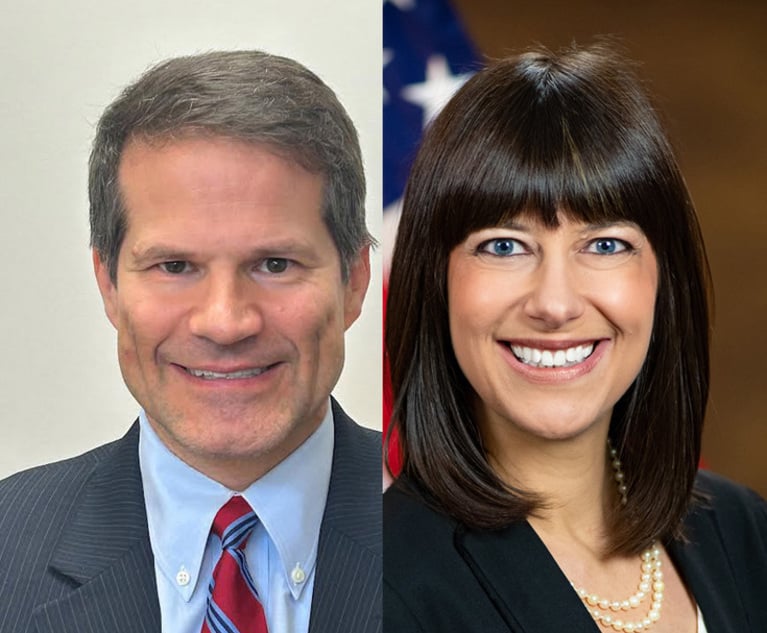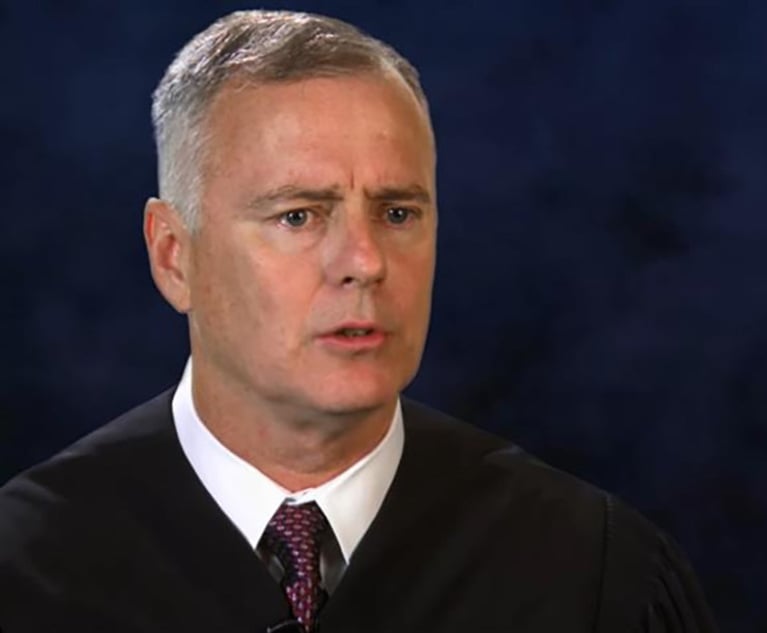 Christine Blasey Ford, center, arrives with her lawyer, Michael Bromwich, left, to testify Thursday. Photo: Andrew Harnik/Pool via Bloomberg
Christine Blasey Ford, center, arrives with her lawyer, Michael Bromwich, left, to testify Thursday. Photo: Andrew Harnik/Pool via BloombergKavanaugh Dismissed Polygraphs as Unreliable, but He's Said They Can Be Useful
“Of course those are not admissible in federal court but I'll do whatever the committee wants," the Supreme Court nominee said Thursday. A 2016 ruling he wrote in the D.C. Circuit presents a more nuanced view of how these tests are used.
September 28, 2018 at 12:31 PM
4 minute read
Christine Blasey Ford testified that she took a polygraph test to bolster her claim that U.S. Supreme Court nominee Brett Kavanaugh sexually assaulted her when they were in high school, a sliver of a daylong, emotional hearing over an allegation that would test the judge's credibility and his fitness to serve on the high court.
Ford described the emotional process of taking the polygraph in August, before her claims went public in a Washington Post report. The polygraph results, which found Ford's account truthful, were admitted in the record before the Senate Judiciary Committee. Ford alleged Kavanaugh pinned her to a bed, rubbed himself against her and covered her mouth to keep her from screaming during a gathering in the 1980s at a house in suburban Washington. Kavanaugh has strongly denied the claims, calling them part of a political hit-job.
Democratic Sen. Kamala Harris of California, a former prosecutor, asked Kavanaugh if he had taken such a test, and he said he had not but would do whatever the judiciary committee wanted. He added: “Of course those are not admissible in federal court but I'll do whatever the committee wants. They're not admissible in federal court because they're not reliable, as you know.”
I asked Kavanaugh whether, like Dr. Ford, he had taken a polygraph, whether he would call for an FBI investigation into the allegations, and whether he watched Dr. Ford's testimony. None of his answers were "yes." pic.twitter.com/jKsTFXx4jD
— Kamala Harris (@SenKamalaHarris) September 28, 2018
Kavanaugh's dismissive response clashes with an earlier posture on polygraphs that he articulated in a May 2016 ruling in the U.S. Court of Appeals for the D.C. Circuit, where he has served since 2006. Kavanaugh's writing in that ruling got widespread new attention on Thursday.
Kavanaugh authored the opinion in Sacks v. U.S. Department of Defense, which involved polygraph tests in a dispute over federal open-records fees. Kavanaugh described the importance of a polygraph test for law enforcement agencies to test the credibility of witnesses and criminal defendants. He also said employers can use them during hiring decisions.
Such background investigations could assess an applicant's qualification and the polygraph examinations serve law enforcement purposes, Kavanaugh said.
“Law enforcement agencies use polygraphs to test the credibility of witnesses and criminal defendants,” Kavanaugh wrote. “Those agencies also use polygraphs to 'screen applicants for security clearances so that they may be deemed suitable for work in critical law enforcement, defense, and intelligence collection roles.'”
According to the U.S. Justice Department, there is no specific provision surrounding the admissibility of polygraph examination results. Courts of appeals have largely upheld the exclusion of polygraph evidence on the grounds that they are not “generally accepted” by the scientific evidence.
Ford's lawyers, Debra Katz of Washington's Katz Marshall & Banks and Michael Bromwich, had wanted the polygraph expert to testify at Thursday's hearing. Sen. Amy Klobuchar, D-Minnesota, said that the judiciary committee refused to hear from that expert.
Arizona prosecutor Rachel Mitchell, hired by Republican judiciary committee members to question Ford, asked her about the polygraph—and who paid for it. Katz and Bromwich shut down that line of questioning, saying they had paid for it. “As is routine,” Bromwich said.
The judiciary committee was expected to vote Friday afternoon to send Kavanaugh's nomination to the full Senate for consideration.
Ford's polygraph is posted below:
|Read more:
This content has been archived. It is available through our partners, LexisNexis® and Bloomberg Law.
To view this content, please continue to their sites.
Not a Lexis Subscriber?
Subscribe Now
Not a Bloomberg Law Subscriber?
Subscribe Now
NOT FOR REPRINT
© 2024 ALM Global, LLC, All Rights Reserved. Request academic re-use from www.copyright.com. All other uses, submit a request to [email protected]. For more information visit Asset & Logo Licensing.
You Might Like
View All

Trump's Solicitor General Expected to 'Flip' Prelogar's Positions at Supreme Court

Auditor Finds 'Significant Deficiency' in FTC Accounting to Tune of $7M
4 minute read
Texas Court Invalidates SEC’s Dealer Rule, Siding with Crypto Advocates
3 minute readTrending Stories
- 1Democratic State AGs Revel in Role as Last Line of Defense Against Trump Agenda
- 2Decision of the Day: Split Circuit Panel Bars Enforcement of Ivory Law's 'Display Restriction' on Antique Group Members
- 3Chiesa Shahinian Bolsters Corporate Practice With 5 From Newark Boutique
- 42 Years After Paul Plevin Merger, Quarles & Brady’s Revenue Up More than 13%
- 5Trade Fixtures In New York Eminent Domain Cases - What Qualifies and How Are They Valued?
Who Got The Work
Michael G. Bongiorno, Andrew Scott Dulberg and Elizabeth E. Driscoll from Wilmer Cutler Pickering Hale and Dorr have stepped in to represent Symbotic Inc., an A.I.-enabled technology platform that focuses on increasing supply chain efficiency, and other defendants in a pending shareholder derivative lawsuit. The case, filed Oct. 2 in Massachusetts District Court by the Brown Law Firm on behalf of Stephen Austen, accuses certain officers and directors of misleading investors in regard to Symbotic's potential for margin growth by failing to disclose that the company was not equipped to timely deploy its systems or manage expenses through project delays. The case, assigned to U.S. District Judge Nathaniel M. Gorton, is 1:24-cv-12522, Austen v. Cohen et al.
Who Got The Work
Edmund Polubinski and Marie Killmond of Davis Polk & Wardwell have entered appearances for data platform software development company MongoDB and other defendants in a pending shareholder derivative lawsuit. The action, filed Oct. 7 in New York Southern District Court by the Brown Law Firm, accuses the company's directors and/or officers of falsely expressing confidence in the company’s restructuring of its sales incentive plan and downplaying the severity of decreases in its upfront commitments. The case is 1:24-cv-07594, Roy v. Ittycheria et al.
Who Got The Work
Amy O. Bruchs and Kurt F. Ellison of Michael Best & Friedrich have entered appearances for Epic Systems Corp. in a pending employment discrimination lawsuit. The suit was filed Sept. 7 in Wisconsin Western District Court by Levine Eisberner LLC and Siri & Glimstad on behalf of a project manager who claims that he was wrongfully terminated after applying for a religious exemption to the defendant's COVID-19 vaccine mandate. The case, assigned to U.S. Magistrate Judge Anita Marie Boor, is 3:24-cv-00630, Secker, Nathan v. Epic Systems Corporation.
Who Got The Work
David X. Sullivan, Thomas J. Finn and Gregory A. Hall from McCarter & English have entered appearances for Sunrun Installation Services in a pending civil rights lawsuit. The complaint was filed Sept. 4 in Connecticut District Court by attorney Robert M. Berke on behalf of former employee George Edward Steins, who was arrested and charged with employing an unregistered home improvement salesperson. The complaint alleges that had Sunrun informed the Connecticut Department of Consumer Protection that the plaintiff's employment had ended in 2017 and that he no longer held Sunrun's home improvement contractor license, he would not have been hit with charges, which were dismissed in May 2024. The case, assigned to U.S. District Judge Jeffrey A. Meyer, is 3:24-cv-01423, Steins v. Sunrun, Inc. et al.
Who Got The Work
Greenberg Traurig shareholder Joshua L. Raskin has entered an appearance for boohoo.com UK Ltd. in a pending patent infringement lawsuit. The suit, filed Sept. 3 in Texas Eastern District Court by Rozier Hardt McDonough on behalf of Alto Dynamics, asserts five patents related to an online shopping platform. The case, assigned to U.S. District Judge Rodney Gilstrap, is 2:24-cv-00719, Alto Dynamics, LLC v. boohoo.com UK Limited.
Featured Firms
Law Offices of Gary Martin Hays & Associates, P.C.
(470) 294-1674
Law Offices of Mark E. Salomone
(857) 444-6468
Smith & Hassler
(713) 739-1250








